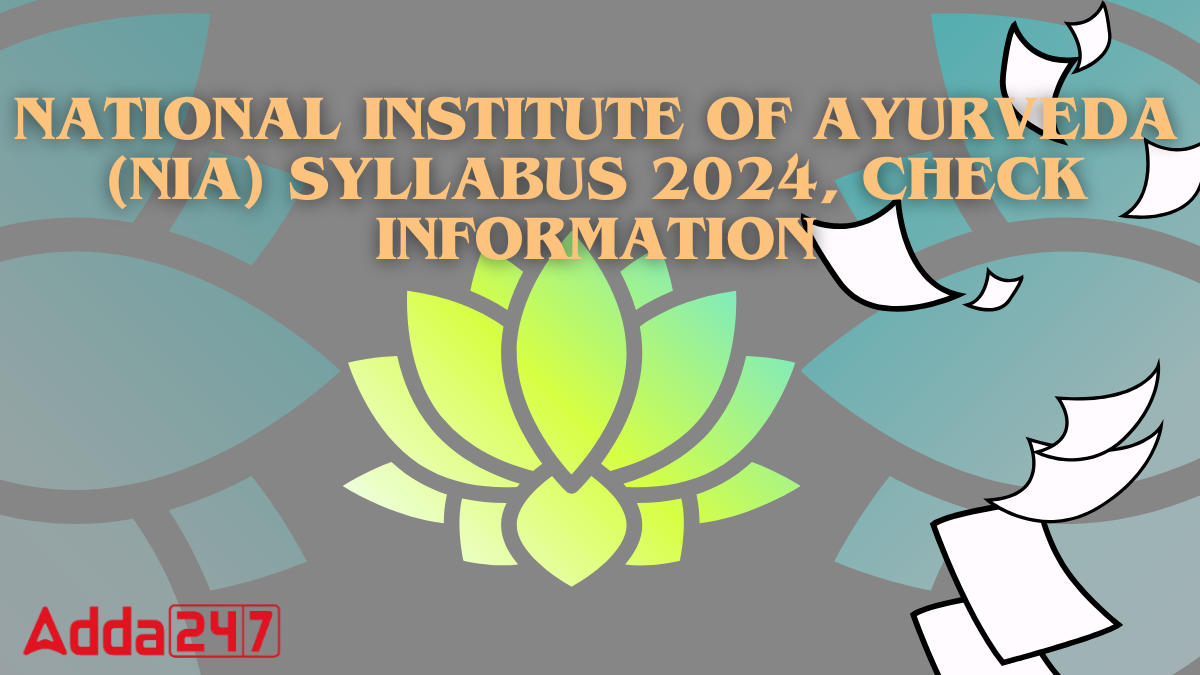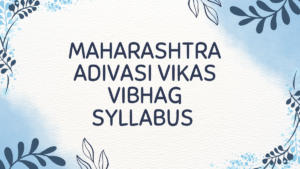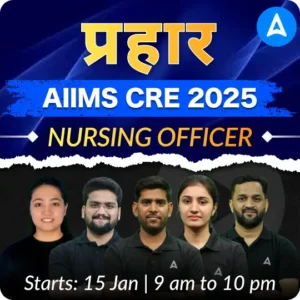Table of Contents
The National Institute of Ayurveda (NIA) Syllabus 2024 was released on the official website of NIA for aspirants. The Syllabus would help applicants to prepare themselves before the examination date. In this article we have shared the in-depth Syllabus details for the aspirants to kick start their exam preparation.
National Institute of Ayurveda (NIA) Recruitment 2024
The official notification shared by the NIA which has 31 vacancies within various roles along with their syllabus information. Here is the breakdown about the National Institute of Ayurveda (NIA) Syllabus 2024, providing aspirants with a clear preparation roadmap.
| National Institute Of Ayurveda Post Wise Overview | |||
|---|---|---|---|
| Name of Post | Number of Posts | Tenure/Deputation | Location |
| Vaidya (Medical Officer) | 1 | Regular | NIA Deemed to be University, Jaipur |
| Clinical Registrar | 2 | Tenure Basis (3 Years) | NIA Deemed to be University, Jaipur |
| Nursing Officer (Ayurved) | 1 | Regular | NIA Deemed to be University, Jaipur |
| Pharmacist (Ayurved) | 2 | Regular | NIA Deemed to be University, Jaipur |
| Multi Tasking Staff (MTS) | 22 | Regular | NIA Deemed to be University, Jaipur |
| Accounts Officer | 1 | On Deputation | NIA Deemed to be University, Jaipur |
| Administrative Officer | 1 | On Deputation | National Institute of Ayurveda, Panchkula (Haryana) |
| Matron | 1 | On Deputation | National Institute of Ayurveda, Panchkula (Haryana) |
National Institute Of Ayurveda (NIA) Syllabus 2024
Before preparing for the NIA Exam 2024, aspirants should go through the detailed National Institute Of Ayurveda (NIA) Syllabus 2024 mentioned on the official website. This syllabus covers the important topics you should prepare for the exam. Aspirants can check the detailed subject-wise syllabus mentioned below:
Vaidya (Medical Officer)
Topics which will be covered in the National Institute Of Ayurveda (NIA) Syllabus 2024 which aspirants must be aware and updated.
| Subject | Syllabus |
|---|---|
| BAMS | Kriya Sharira Sanskrit Padartha Vigyan Ashtanga Hridayam Ayurveda Itihas Rachana Sharir Charak Samhita Dravyaguna Vigyan |
| Medical Statistics | Definition, scope and importance of Medical Statistics Parametric and non-parametric tests Introduction to commonly used statistical software |
| General Knowledge | National and International Events Economy and Business Sports and Games Current General Knowledge Science and Technology |
Clinical Registrar (Ayurveda)
Topics which will be covered in the National Institute Of Ayurveda (NIA) Syllabus 2024 Clinical Registrar (Ayurveda) which aspirants must be aware and updated.
| Category | Topics/Subjects |
|---|---|
| Fundamentals of Ayurveda | Dosha-Dhatu-Mala Vigyana Agni (digestive fire) and Ama (toxins) Srotas (body channels) and their pathologies Concepts of Prakriti (body constitution) |
| Study of Classical Texts | Charaka Samhita (Sutrasthana and Nidanasthana) Sushruta Samhita (Sutrasthana) Ashtanga Hridayam (Sutrasthana) |
| Research Methodology and Biostatistics | Basics of research in Ayurveda Study designs: observational, experimental and clinical trials Statistical tools and software applications |
| Introduction to Modern Medicine | Basics of anatomy, physiology and pathology Pharmacology related to Ayurvedic drugs |
| Disease Pathology and Diagnosis (Nidana and Vikriti Vigyana) | Nidana Panchaka (etiology, premonitory signs, symptoms, pathogenesis, complications) Roga Vinishchaya (differential diagnosis) Dosha-Dushya Sammurchana (pathogenesis) |
| Study of Diseases (Rogadhikaras) | Jwara (fever) Prameha (diabetes and metabolic disorders) Grahani Roga (digestive disorders) Udara Roga (abdominal diseases) Raktapitta (bleeding disorders) |
| Rasayana and Vajikarana | Rejuvenation therapies Sexual health and aphrodisiac therapies |
| Ayurvedic Pharmacology (Dravyaguna) | Therapeutic properties of Ayurvedic herbs Formulation and dosage |
| Advanced Clinical Management | Chronic diseases: arthritis, diabetes, respiratory disorders Autoimmune disorders and their Ayurvedic management Cardiac diseases (Hridaya Roga) Mental health disorders (Manasa Roga) |
| Modern Diagnostic Techniques | Pathology tests, imaging and laboratory diagnosis Interpretation of modern diagnostic results in Ayurvedic terms |
| Emergency and Critical Care in Ayurveda | Agantuja Vyadhi (trauma and accidental injuries) Management of poisoning and acute conditions |
| Dissertation | Submission and defense of research work Viva-voce based on the dissertation and clinical case studies |
Nursing Officer (Ayurved)
Topics which will be covered in the National Institute Of Ayurveda (NIA) Syllabus 2024 Nursing Officer (Ayurved) which aspirants must be aware and updated.
| S.No. | Topic | Subtopics |
|---|---|---|
| 1 | Ayurvedic Principles and Practices | Introduction to Ayurveda: Tridosha, Saptadhatu, Malas, Panchamahabhutas, Prakriti, Vikriti, Role of Agni Ayurvedic Pathology: Diagnosis (Nadi, Mutra, Jihva), Disease concept, Classification of diseases |
| 2 | Ayurvedic Pharmacology | Herbal Medicine: Common Ayurvedic herbs, Formulation of medicines (Kwath, Churna, Asava, Arishta, Bhasma) Pharmacological actions (Vata, Pitta, Kapha balancing herbs) Dosage and administration of Ayurvedic medicines |
| 3 | Nursing and Patient Care (Ayurvedic) | Ayurvedic Nursing Practices: Techniques for Panchakarma, Role of Ayurvedic diet (Pathya, Apathya), Preventive care Patient Assessment: Clinical assessment, Preparation for Ayurvedic treatments (Panchakarma, Nasya) |
| 4 | Medical and Surgical Nursing | Basics of Anatomy and Physiology: Ayurvedic perspective, Common diseases treated in Ayurveda Surgical and Non-Surgical Procedures: Panchakarma procedures, Post-operative care |
| 5 | Ayurveda in Women’s Health and Pediatrics | Gynecology in Ayurveda: Ayurvedic treatment for menstrual disorders, PCOS Pediatrics in Ayurveda: Ayurvedic approach to childhood diseases, Child care practices |
| 6 | Modern Nursing Practices | Basic Nursing Care: Principles, Infection control, First Aid Patient Communication: Effective communication, Counseling techniques |
| 7 | General Knowledge and Current Affairs | National and International Affairs, Health & Medical Developments, General Knowledge on Ayurveda and healthcare regulations |
| 8 | Practical Knowledge in Ayurveda | Ayurvedic Treatment Procedures: Understanding and practice of Panchakarma, Ayurvedic oil massage techniques and therapeutic uses |
Pharmacist (Ayurved)
Topics which will be covered in the National Institute Of Ayurveda (NIA) Syllabus 2024 for Pharmacist (Ayurved) which aspirants must be aware and updated.
| S.No. | Topic | Subtopics |
|---|---|---|
| 1 | Basic Principles of Ayurveda | Introduction to Ayurveda: Tridosha, Saptadhatu, Malas, Panchamahabhutas, Prakriti, Vikriti Concept of Agni and Ama (digestive fire and toxins) Role of digestive fire in health |
| 2 | Ayurvedic Pharmacology | Herbal Medicine: Common Ayurvedic herbs and their therapeutic uses Pharmacological actions of Ayurvedic herbs (Vata, Pitta, Kapha balancing) Formulations: Kwath, Churna, Asava, Arishta, Bhasma |
| 3 | Dosage and Administration | Ayurvedic dosage forms and administration Preparation and use of Ayurvedic medicines Therapeutic dosages and precautions in drug administration |
| 4 | Pharmaceutical Procedures in Ayurveda | Preparation Techniques: Decoction, Powder, Paste, Infusion, Syrup, Oil and Bhasma Pharmacovigilance: Adverse effects and safety protocols Storage, preservation and labeling of Ayurvedic medicines |
| 5 | Ayurvedic Drug Interactions | Drug-herb interactions Potential side effects of commonly used Ayurvedic drugs Contraindications of Ayurvedic formulations |
| 6 | Ayurvedic Toxicology (Rasa Shastra) | Understanding Toxicity: Identification and management of toxic substances used in Ayurveda Use of Metals and Minerals in Ayurvedic treatment (e.g., Bhasma) |
| 7 | Clinical Application of Ayurvedic Medicines | Treatment of Common Ailments: Diseases of Vata, Pitta, Kapha imbalance and Ayurvedic remedies Specialized Treatments: For digestive disorders, respiratory issues, skin diseases, etc. |
| 8 | Ayurvedic Pharmacognosy | Study of plant and mineral sources of Ayurvedic drugs Collection, identification and preparation of medicinal plants Study of Ayurvedic pharmacopoeia |
| 9 | Basic Medical Sciences for Pharmacists | Anatomy and Physiology: Overview relevant to Ayurvedic treatments Modern Medicine Basics: Interaction of Ayurvedic and allopathic treatments Pathology and Microbiology |
| 10 | Current Trends in Ayurvedic Research | Research methodology in Ayurvedic pharmacology Overview of clinical trials and evidence-based Ayurveda Modern advances in Ayurvedic medicine and formulations |
| 11 | General Knowledge | Ayurveda in the Modern World: Role in contemporary healthcare Healthcare Policies and Regulations related to Ayurvedic drugs General Knowledge: Trends in medicine and healthcare |
Multi Tasking Staff (MTS)
Topics which will be covered in the National Institute Of Ayurveda (NIA) Syllabus 2024 for MTS which aspirants must be aware and updated.
| S. No. | Subject |
|---|---|
| 1 | English |
| 2 | Hindi |
| 3 | Computer (Basic Knowledge) |
| 4 | General Knowledge and Current Affairs |
| 5 | Numerical Aptitude |
| 6 | General Intelligence and Reasoning |
Accounts Officer
Topics which will be covered in the National Institute Of Ayurveda (NIA) Syllabus 2024 for Accounts Officers which aspirants must be aware and updated.
| S.No | Subject Area | Topics |
|---|---|---|
| 1 | General Knowledge | National and International Affairs: Political, social and cultural developments. Current Affairs: Recent events and issues related to India and the world. Science and Technology: Innovations, technological advancements and scientific knowledge. |
| 2 | Quantitative Aptitude and Reasoning | Numerical Ability: Basic mathematics, profit and loss, percentage, ratio, time and work, time and distance, averages, etc. Data Interpretation: Graphs, charts, tables and their interpretation. Reasoning: Logical reasoning, number series, puzzles, coding-decoding, direction sense and blood relations. |
| 3 | Accounts and Finance | Fundamentals of Accounting: Double-entry system, journal, ledger, trial balance, balance sheet and cash flow. Taxation: Basic knowledge of direct and indirect taxes (GST, Income Tax, etc.). Government Accounting: Government financial management, budgeting and expenditure control. Cost and Management Accounting: Cost concepts, break-even analysis, cost sheet preparation and budgetary control. Financial Management: Profitability analysis, financial planning and investment decisions. |
| 4 | Computer Knowledge | Basic Computer Skills: MS Word, Excel, PowerPoint. Accounting Software: Knowledge of Tally or similar software for accounting and auditing. Internet: Basic internet usage and online research. |
| 5 | English and Hindi Language | English Comprehension: Understanding passages, vocabulary, grammar and sentence construction. Hindi Comprehension: Understanding passages, grammar and vocabulary in Hindi. |
| 6 | General Mental Ability | Analytical Ability: Understanding logical sequences and relations. Critical Thinking: Problem-solving using logical reasoning and analysis. |
| 7 | Administrative and Regulatory Framework | Public Administration: Functions of government agencies, administrative processes and decision-making. Regulatory Framework: Legal frameworks related to accounts and finance, especially in the public sector. |
| 8 | Specialized Knowledge in Ayurveda (Optional/Applicable) | Basic understanding of Ayurveda and related practices, especially in the context of government funding, accounting and budgeting for Ayurvedic institutions like NIA. |
Administrative Officer
Topics which will be covered in the National Institute Of Ayurveda (NIA) Syllabus 2024 for Administrative Officers which aspirants must be aware and updated.
| S.No | Subject Area | Topics |
|---|---|---|
| 1 | General Knowledge | National and International Affairs: Political, social and cultural developments. Current Affairs: Recent events and issues related to India and the world. Science and Technology: Innovations, technological advancements and scientific knowledge. Indian History, Geography and Culture. Indian Constitution and governance. |
| 2 | Administrative Knowledge | Public Administration: Functions of government agencies, administrative processes and decision-making. Government structure: Ministries, departments and agencies. Administrative reforms and policies. Management principles: Organizational behavior, communication and leadership. Office management and procedures. |
| 3 | Accounts and Finance | Fundamentals of Accounting: Double-entry system, journal, ledger, trial balance, balance sheet and cash flow. Financial Management: Budgeting, financial planning and expenditure control. Government Accounting: Government financial management and accounting systems. Taxation: Direct and indirect taxes, including GST and Income Tax. Costing and financial analysis. |
| 4 | Human Resource Management | Recruitment and selection processes. Staff development and training. Employee welfare and relations. Performance appraisal and motivation. Labour laws and regulations. |
| 5 | Computer Knowledge | Basic Computer Skills: MS Word, Excel, PowerPoint. Office Management Software: Knowledge of Tally, MS Office Suite and other office tools. Internet and online research. Data management and security practices. |
| 6 | Communication Skills | Verbal and Written Communication: Drafting official correspondence, reports and presentations. Communication methods in administration. Public relations and internal communication. |
| 7 | Legal and Regulatory Framework | Legal and regulatory knowledge related to public administration. Labour laws, government contracts and agreements. Official procedures and compliance with government rules. |
| 8 | Ayurvedic Administrative Knowledge (Optional/Applicable) | Basic understanding of Ayurveda. Ayurvedic institutions and their administration. Budgeting and financial management in Ayurvedic settings like NIA. |
Matron
Topics which will be covered in the National Institute Of Ayurveda (NIA) Syllabus 2024 for Matron Officers which aspirants must be aware and updated.
| S.No | Subject Area | Topics |
|---|---|---|
| 1 | General Knowledge | National and International Affairs: Political, social and cultural developments. Current Affairs: Recent events and issues related to India and the world. Science and Technology: Innovations, technological advancements and scientific knowledge. Indian History, Geography and Culture. Indian Constitution and governance. |
| 2 | Healthcare and Nursing Practices | Nursing Techniques in Ayurveda: Ayurvedic nursing practices, patient care protocols, Ayurvedic treatment methods (Panchakarma, Nasya, etc.). Health & Hygiene: Preventive healthcare and infection control. Patient Care: Role of diet (Pathya and Apathya) in treatment and recovery. Patient Assessment: Ayurvedic parameters for assessing patients (Nadi, Mutra, Jihva Pariksha). Post-Treatment Care: Patient follow-up, managing recovery post-treatment. |
| 3 | Ayurvedic Principles and Practices | Basic principles of Ayurveda: Tridosha (Vata, Pitta, Kapha), Saptadhatu (seven tissues) and Malas (wastes). Concept of Agni (digestive fire): Importance of Agni in health and disease. Diseases and Treatments: Common diseases treated in Ayurveda, focusing on the role of the matron in patient management. Ayurvedic Pharmacology: Knowledge of commonly used herbs and Ayurvedic medicines, formulations (Kwath, Churna, Asava, Arishta, Bhasma). |
| 4 | Human Anatomy and Physiology | Basics of human anatomy and physiology with a focus on the Ayurvedic perspective. Understanding body systems and their relationship to Ayurvedic treatments. Role of Agni and Digestive Health: Link between digestive fire (Agni) and physical well-being. |
| 5 | Administrative and Supervisory Skills | Managing Healthcare Settings: Duties of a matron in hospital or healthcare administration, managing staff and resources. Personnel Management: Handling nursing staff and other healthcare personnel. Legal and Ethical Responsibilities: Knowledge of healthcare regulations, rights of patients and ethical practices. Documentation and Record Keeping: Managing patient records, treatment plans and confidential documentation. |
| 6 | Communication Skills | Patient Communication: Effective communication techniques with patients, families and healthcare teams. Public Relations: Managing relations within the hospital environment, handling patient grievances. Team Leadership: Supervising and guiding staff, ensuring smooth operations in the healthcare setting. |
| 7 | Modern Healthcare Practices | Basic Nursing Care: First aid, infection control and emergency procedures. Surgical and Non-Surgical Procedures: Basic knowledge of common procedures, post-operative care and prevention of complications. Mental Health: Addressing mental well-being, especially in patients undergoing long-term Ayurvedic treatments. |
| 8 | General Mental Ability | Analytical skills, logical reasoning and problem-solving related to healthcare and administrative tasks. Critical thinking for patient care and management decisions. |
| 9 | General Knowledge and Current Affairs | Healthcare Innovations: Latest trends and advancements in Ayurvedic and modern healthcare practices. Public Health Issues: Understanding national healthcare policies and their impact on Ayurvedic institutions. |
Additional Topics
- Emergency Care and Trauma Management: Basic emergency care principles in Ayurveda.
- Ayurvedic Treatments for Women’s Health and Pediatrics: Focus on gynecological issues, child health and specific Ayurvedic treatments for both.
- Panchakarma Procedures: Detailed knowledge of Ayurvedic detoxification methods, roles and responsibilities of the matron in administering these treatments.




 DSSSB Pharmacist Syllabus, Check Syllabu...
DSSSB Pharmacist Syllabus, Check Syllabu...
 Maharashtra Adivasi Vikas Vibhag Syllabu...
Maharashtra Adivasi Vikas Vibhag Syllabu...
 BMCRI Nursing Officer Recruitment 2025, ...
BMCRI Nursing Officer Recruitment 2025, ...



 Adda247 Job portal has complete information about all Sarkari Jobs and Naukri Alerts, its latest recruitment notifications, from all state and national level jobs and their updates.
Adda247 Job portal has complete information about all Sarkari Jobs and Naukri Alerts, its latest recruitment notifications, from all state and national level jobs and their updates.